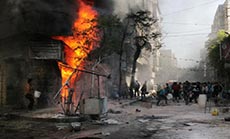
Syria: Grand Compromise or Total War?

By: Ibrahim al-Amin
Al-Akhbar, October 21, 2013
The region is approaching the last round of confrontation before the warring parties enter into negotiations. In the coming months, each side will up the ante, hoping to score the greatest possible gains before the big players decide to begin their talks.
 During the first 18 months of the Syrian crisis, the West and its local allies succeeded in besieging the regime in Damascus, forcing it to concede large swathes of territory to the opposition and fight a defensive war. But when the fighters came close to the heart of the capital, the decision was made by Syria's allies to enter the fray.
During the first 18 months of the Syrian crisis, the West and its local allies succeeded in besieging the regime in Damascus, forcing it to concede large swathes of territory to the opposition and fight a defensive war. But when the fighters came close to the heart of the capital, the decision was made by Syria's allies to enter the fray.
With cover from Iran and Russia, Hizbullah threw its weight behind the Bashar al-Assad regime and prevented its downfall. And within a year, the Lebanese Resistance helped the Syrian government revise its military strategy, tipping the balance on a number of fronts in favor of Damascus.
The road to any kind of resolution in Syria is still long and bloody in many respects, for the fighting will continue even as the negotiations begin.
The response to Hizbullah's intervention took many forms until it reached the threat of direct foreign intervention on the part of the United States. The intent was to reverse the regime's recent gains and to strike a fatal blow that would lead to al-Assad's fall. But many things prevented this scenario from playing out, so what about the alternative?
Compromise is the only logical alternative to war, but any resolution is likely to be regional this time. After all, it was the West, and particularly Washington, which played a major role in tying all the files in region - including the Arab-"Israeli" struggle - to the outcome of the Syrian crisis.
That the settlement will be comprehensive, however, does not mean that all the region's outstanding problems will be resolved together as one package, but it will nevertheless create a different political environment that is favorable to compromise, whereby those who were slated to be toppled, but managed to survive, will have a stronger presence.
There will undoubtedly be many obstacles along the path to this kind of regional settlement, with powerful forces like the ruling Saud family doing all they can to prevent such an outcome. Riyadh doesn't really have much of a strategy to achieve its ends, believing that money can get them whatever they want.
But, what about Syria? Will the bloodletting end anytime soon?
The road to any kind of resolution in Syria is still long and bloody in many respects, for the fighting will continue even as the negotiations begin. No force, either regionally or internationally, can safeguard a settlement inside the country - only a reconciliation between the warring sides can produce any lasting peace.
The problem is that the Syrian conflict has long ago ceased to be a purely national one, and therefore any sovereign decision to solve the matter internally is next to impossible. And so for yet another decade at least, Syria will remain the focus of attention for the region and the world, before the Syrian people are able to take matters into their own hands.
Comments
- Related News



